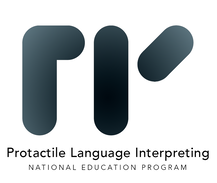|
Within a framework of evidence-based practice, the Protactile Language Interpreting National Education Program (PLI) aims to enhance communication access for persons who are DeafBlind by increasing the number of interpreters able to effectively interpret utilizing tactile communication and other strategies.
Our VisionPLI envisions a world that celebrates the life and culture of DeafBlind persons, a world where DeafBlind people have influence and control over their destiny and dreams.
|
part of the Research and Resource Center with Deaf communities
at Western Oregon University |
Our Mission
The mission of PLI is to honor the diversity and range of communication preferences of DeafBlind individuals, or those who have a combination of vision and hearing loss, by increasing the range and number of culturally-competent and qualified interpreters and mentors.
Our Core Values
Among many others, PLI holds these core values as it conducts its work.
- Autonomy: We are committed to supporting the autonomy of DeafBlind individuals and those with a combination of vision and hearing loss.
- Integrity: We value the integrity of our relationship with the DeafBlind community through the life of the grant and beyond.
- Collaboration: We recognize the key to creating change is engaging in active collaboration with our mentors, community partners, stakeholders and service providers.
- Humanity: We work to honor our collective humanity and respect the DeafBlind’s community’s culture.
- Results: We believe in the strength of evidence-based practices and that without evaluation, effectiveness and impact cannot be measured or assumed.
- Trust: We believe that that DeafBlind Community’s language is unique and are honored to be entrusted by the DeafBlind community and RSA to carry out this important work and take this responsibility very seriously.
- Stewardship: We recognize the fiscal and programmatic responsibility given us by our funders and are committed to ethical and responsible practices in all we do.


